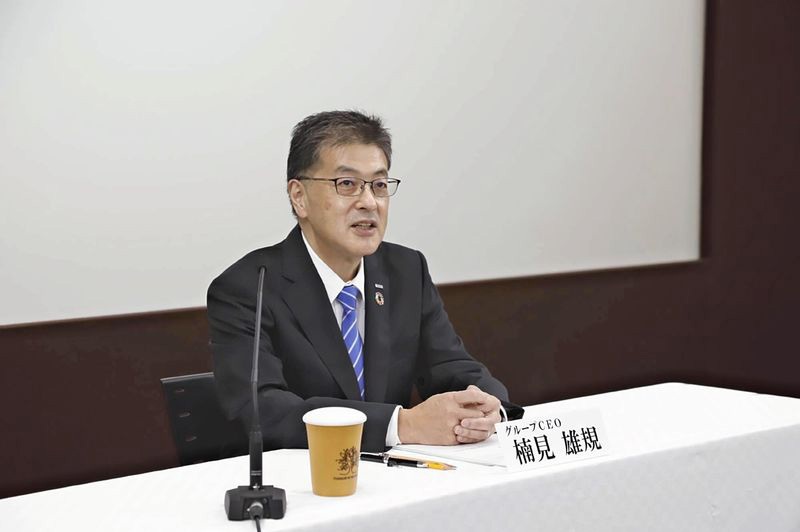
Energy Co.’s office in Moriguchi, Osaka Prefecture, after some refurbishments, is seen on Jan. 11.
13:40 JST, January 23, 2022
OSAKA — Panasonic Corp. plans to make the switchover to a holding company in April 2022, complete with a name change to Panasonic Holdings, to navigate out of prolonged stagnation and regain its global position.
Eight subsidiaries, such as for home appliances and batteries, will be established under the holding company’s umbrella with investment and personnel authority granted to each company. Is it possible for the group to increase competitiveness and grow again?
Independence
Energy Co. in Moriguchi, Osaka Prefecture, is a department of Panasonic Corp. that mainly handles batteries for electric vehicles.
In mid-January, Energy Co. was in the process of refurbishing its offices. A forest setting has been created at its entrance that includes tents and camping chairs. The renovation is meant to highlight Energy Co.’s new independence as a subsidiary — Panasonic Energy Co. — starting in April.

Panasonic President Yuki Kusumi speaks online about the electronics giant’s transition to a holding company system in October 2021.
“I want to raise employee awareness with an interior decoration scheme that’s in line with our new company’s mission: contribution to the environment,” said Energy Co. President and Chief Executive Officer Kazuo Tadanobu. “I hope this will lead to the acquisition of excellent human resources.”
Until now, Panasonic has recruited employees all at once and assigned them to various departments, such as batteries and home appliances. From April, each department will become a subsidiary and recruit employees on their own, meaning the subsidiaries will vie with each other to attract talent.
Salary and personnel systems will also be managed at the discretion of each subsidiary. As of April, salaries will be decided using the same standard, but can be changed after that by each company, according to its performance and the situation of the industry.
Representative Director Yasuyuki Higuchi, president of Connected Solutions Company, one of such divisions, welcomed this reorganization because he will be able to flexibly adapt to situations facing the industry.
Sense of crisis
Behind Panasonic’s decision to move to the new system is a strong sense of crisis in its business performance, which continues to be sluggish.
“We haven’t been able to grow for the last 30 years,” Panasonic President Yuki Kusumi said in a document posted online in July.
Panasonic made Panasonic Electric Works Co. and Sanyo Electric Co. wholly owned subsidiaries in April 2011, and recorded sales of ¥7.8 trillion for the fiscal 2011. Since then, Panasonic’s sales have exceeded this figure only twice in the last 10 years.
The company concluded that excessive dependence on the massive organization was one of the factors.
Former President Kazuhiro Tsuga, now chairman, once set a goal of achieving a operating profit margin of 5%. However, each business division became obsessed with that figure, and was satisfied when it was achieved.
The company has recognized the hindrance of growth in slow decision-making on strategic investments and withdrawing from poorly performing businesses. Another problem was in having 240,000 employees and diverse businesses.
“We believed that even if the competitiveness of one’s business declined, it would be OK as long as the company is kept as a whole,” said an executive of the corporation.
What to aim for
When Panasonic announced the holding company transition in November 2020, it focused on four divisions as leading growth subsidiaries; batteries; home appliances and air conditioning; electronic components; and business-use systems.
However, Kusumi withdrew this plan the following October, explaining, “The morale of employees has declined in businesses that were not focused, and our business partners were worried about that.”
Earlier this month, Kusumi cited global warming countermeasures at a briefing session for analysts, saying, “In order to realize an ideal society rich in things and people’s hearts, we will give top priority to global environmental issues as the company’s mission.”
The company will announce its medium-term management plan and the strategies for each subsidiary this spring or later.
“Panasonic must clearly show its potential strengths in products and technologies, and come up with effective and persuasive strategies.” said Satoshi Sakae, an analyst at the Daiwa Securities. “Otherwise, the market will not react.”
Behind Sony, Hitachi
Major electronics companies fell into a huge final profit deficit across the board after the 2008 global financial crisis triggered by the collapse of U.S. investment bank Lehman Brothers. However, the market evaluation of each company differed greatly depending on what kind of management strategy they subsequently launched.
Sony Group Corp., which had competed with Panasonic as a rival, proceeded to sort out unprofitable businesses and shifted its focus to entertainment such as games and movies.
Hitachi Ltd. invested more than ¥1 trillion to acquire the U.S. tech company Global Logic last year, and will continue to expand its technology services business for companies, which Hitachi has been good at.
The effect of these efforts is clearly reflected in the market capitalization of stocks. As of Jan. 17, Sony’s market capitalization was ¥17.9514 trillion and that of Hitachi was ¥6.4707 trillion, while that of Panasonic was only ¥3.2587 trillion.
“Sony and Hitachi have emphasized the direction they are aiming for as a company or the field they have been good at to change their business structures. These efforts have produced results,” said Ryosuke Katsura, a senior analyst at SMBC Nikko Securities Inc. “Panasonic needs to show not only its environmental efforts but also what business it will depend on to grow.”
Top Articles in Business
-

Prudential Life Insurance Plans to Fully Compensate for Damages Caused by Fraudulent Actions Without Waiting for Third-Party Committee Review
-

Narita Airport, Startup in Japan Demonstrate Machine to Compress Clothes for Tourists to Prevent People from Abandoning Suitcases
-

Japan, U.S. Name 3 Inaugural Investment Projects; Reached Agreement After Considerable Difficulty
-

Toyota Motor Group Firm to Sell Clean Energy Greenhouses for Strawberries
-

SoftBank Launches AI Service for Call Centers That Converts Harsh Customer Voices into Softer Voices
JN ACCESS RANKING
-

Producer Behind Pop Group XG Arrested for Cocaine Possession
-

Japan PM Takaichi’s Cabinet Resigns en Masse
-

Man Infected with Measles Reportedly Dined at Restaurant in Tokyo Station
-

Israeli Ambassador to Japan Speaks about Japan’s Role in the Reconstruction of Gaza
-

Videos Plagiarized, Reposted with False Subtitles Claiming ‘Ryukyu Belongs to China’; Anti-China False Information Also Posted in Japan






















